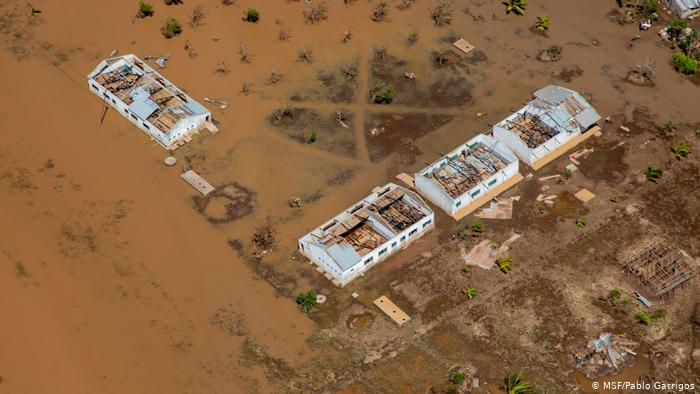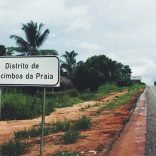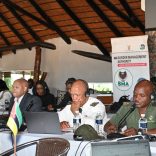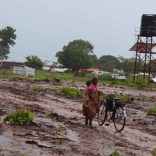Mozambique: One killed by terrorists in Mocímboa da Praia district - AIM report
Cyclone Idai: Access and financing are the greatest difficulties of the World Food Program

DW
The World Food Program (WFP) needs US$130 million to continue supporting people affected by Cyclone Idai in central Mozambique, according to Maputo representative Karin Manente. The WFP has declared the “highest-level emergency” in the country and launched a large-scale operation, with provisions being sent to the affected areas.
Data from the United Nations indicate that Cyclone Idai affected 1.85 million people in Mozambique, with more than 480,000 being displaced by floods that submerged and destroyed an area of more than 3,000 square kilometers. The WFP rates Cyclone Idai as one of the worst in the last decade, and the worst in the Southern Hemisphere in the last 200 years.
In an interview with DW Africa, Karin Manente highlights the WFP’s “strong partnership” with the National Institute for Disaster Management (INGC), the Mozambican government and communities, and is confident of the WFP’s capacity to meet the complexity of helping in the initial phases. Drinking water and food remain top priorities.
DW Africa: The United Nations World Food Program says that the situation in Mozambique is “an emergency at the highest level”. What is WFP doing on the ground right now?
Karin Manente (KM): First, it must be said that WFP was already on the ground before the cyclone arrived. WFP has a very strong partnership with the National Institute for Disaster Management (INGC) and with the Government of Mozambique and with communities in the areas where these hazards exist, we work together on planning and response. Before the cyclone we had already staff and food prepositioned and we were already responding to floods in Tete and Zambezia. After the passing of the cyclone, we were part of the first group that entered the city of Beira to assess the situation and start providing solutions. Forty-eight hours after the cyclone, we were already distributing food. We started with enriched cookies – good for isolated populations. We put up two helicopters, now three, to distribute these cookies to the most remote and isolated villages. We also distributed enriched baby food at accommodation centers in urban areas. So far, we have supported a total of 168,000 people, and the number is growing as access is opened and people go to the centres.
DW Africa: Although they were already on the ground, due to lack of power and communications and access difficulties, the process of distributing aid began in a somewhat chaotic way. How do you overcome this chaos on the ground?
KM: I do not know if I would call it chaos. There was a lot of coordination and leadership from the Mozambican government. And the WFP supports not only the response but also the coordination. We coordinate with partners and, in the area of logistics, the WFP coordinates with government authorities to resolve where help goes, in terms of prioritisation. We have an operations centre in Beira and, little by little, we are going to have better conditions to work under. There are sometimes gaps, but that is the nature of any emergency. For example, we are overcoming the problem of communication, by putting wi-fi in the operations centre for everyone to use. We are already overcoming these things.
DW Africa: What are the difficulties that remain in the distribution of aid?
KM: Access. Means of transport and access to people who are still isolated. The second aspect is financing. WFP started operations with advance funding, and we now have to repay the internal down-payment we made. Our funding requirement is a total of US$130 million: that’s the gap for us to continue the work we are doing now, to the same extent, over the next three months.
DW Africa: We are talking about many people affected and help that is, in many cases, insufficient. Some criticisms are beginning to emerge as to the way government support is distributed. In these high-level emergency situations, how do you ensure that aid reaches those who really need it? Does the United Nations have mechanisms to do this work?
KM: For sure. Before entering a community, we make a quick assessment to find out how many people are here, how many have been hit, how many men, how many women, how many children and what kind of support is needed. Then help is tailored accordingly. But we do not always have the same groceries available. The ideal would be to give a complete package: the food, the tent, the purification of water, the medicines. But not always and everywhere is there this complete package. It is a matter of logistics and organisation at the operational level. Sometimes we do not have transport to all locations at once.
DW Africa: On the ground, do you perceive any frustration or mistrust among people over the way distribution is working? Is it something that hinders the work of WFP?
KM: We are used to this. We assist in many countries. It’s not something we’re not used to hearing or dealing with. The entire emergency response has its initial phase, which is complex. We do everything we can to make our work as efficient as possible. There is a lot of coordination needed, and many stakeholders. It takes a few days to get everything in, fit everything together. We are doing a very good job with the government and partners, and supporting as many people as possible.
DW Africa: In the short term, what are the priorities?
KM: First of all, drinking water. Dirty water brings many health problems. Second, food. Third, medications and shelter. In a second phase, seeds, roads, reconstruction. We have to see everything that has happened and it is still happening not only through a prism of one or two months, but in the longer term as well, because recovery is essential, and will take more time.












Leave a Reply
Be the First to Comment!
You must be logged in to post a comment.
You must be logged in to post a comment.